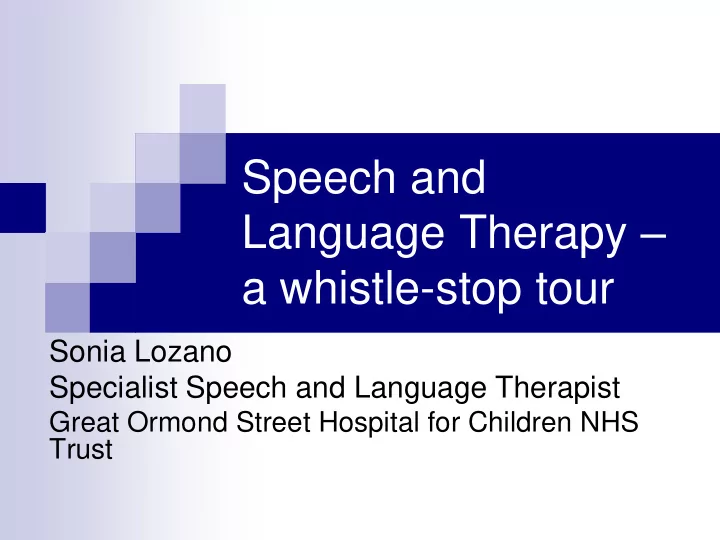

Speech and Language Therapy – a whistle-stop tour Sonia Lozano Specialist Speech and Language Therapist Great Ormond Street Hospital for Children NHS Trust
SLT as part of the clinical team All LSDs MPS III/Infantile Pompe predominance Feeding/Swallowing Communication
Eating and Drinking – the basics safety social adequacy
The Mechanics Anatomy Infants Suck-swallow- breathe Respiration
Thinking about swallowing….. The normal swallow What happens when you swallow? Try swallowing with: your head back vs chin down Your mouth open fast respiratory rate
Safety Airway protection Aspiration: The entry of foreign material in to the airway, below the level of the vocal folds Signs: Colour change Coughing/choking Change in respiratory rate Chest infections/aspiration pneumonia
Assessment – what do we do? History Watch Listen
Videofluoroscopy Image of videofluoroscopy clinic
Videofluoroscopy
videofluoroscopy
What about in Pompe? Jones et al (2009) 100% some feeding difficulties 77% airway invasion 38% aspiration No clear relationship between swallow dysfunction and overall clinical picture
What can we do? Positioning Consistencies/Textures Nutrition management Positive experiences/desensitisation
GOSH caseload January 2011 6 patients 3 Combined non- oral/oral Fully Oral 2 Non-oral 1
What is communication? “ The exchange of thoughts, messages, or information…Interpersonal rapport.” Thefreedictionary.com Language Speech Voice
How does children’s language develop?
Speech Vocal fold vibration Modification of sound via Oral/nasal airflow Articulators
Where are sounds made? k g ng p b BACK OF LIPS TONGUE f v t d s z n l LIPS & FRONT OF TEETH TONGUE
What about Infantile Pompe? Exciting time Muller et al (2009) Language delay @ 18 months 42% Reassessment @ 37months 83% resolved Speech sound errors 82% Hypernasality 82%
How the palate works for speech Palate raised but not touching back Palate raised & touching back of throat. of throat. Air escapes through nose. Air directed out of mouth. Sounds: m, n, ng Sounds: p/b, t/d, k/g, f/v, s/z, sh, ch
Lateral speech x-ray
Summary Emerging evidence Feeding and communication both affected Evidence of improvements in both fields. ?Natural history??? ?Effects of ERT???
Recommend
More recommend